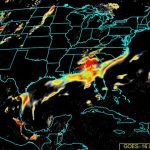Scientists decode the Earth’s inner core
Earth's core, the deepest part of our planet, is characterized by extremely high pressure and temperature.
It is composed of a liquid outer core and...
These fossils add a missing link to crocodile evolution
A set of Triassic archosaur fossils, excavated in the 1960s in Tanzania, have been formally recognised as a distinct species.
It represents one of the...
Scientists find never-before-seen mechanism fueling huge aurorae at Saturn
Leicester space scientists have discovered a never-before-seen mechanism fueling huge planetary aurorae at Saturn.
Saturn is unique among planets observed to date in that some...
New fog detection software helps airlines keep travelers safe
The software uses machine learning techniques with near real-time data from weather satellites to monitor conditions 24/7 and issue potential fog warnings.
Fog and low...
How dark matter could be measured in the solar system
Pictures of the Milky Way show billions of stars arranged in a spiral pattern radiating out from the center, with illuminated gas in between.
But...
Almost all common chemicals on Earth aren’t sustainable, shows study
More than 99% of the most widely produced chemicals aren’t sustainable, research finds.
In addition, their production is based on fossil raw materials and consumes...
Giant mountains across supercontinents controlled the evolution of life on Earth
Giant mountain ranges at least as high as the Himalayas and stretching up to 8,000 kilometers across entire supercontinents played a crucial role in...
Scientists find a ‘one-off gift’ from Martian meteorite
Scientists find the first evidence of high-intensity damage caused by asteroid impact from a Martian meteorite.
The new finding has implications for understanding when conditions...
Scientists find Goldilocks Zone for precious metals in Earth’s crust
Leicester research has identified a new ‘Goldilocks Zone’ in the Earth’s crust which could provide metals vital to the green revolution.
The energy future of...
Be brave like a tiger: Lunar New Year explained
"Everyone should be reminded to be brave like a tiger this year."
That's the sage advice of a young China studies scholar at The Australian...










